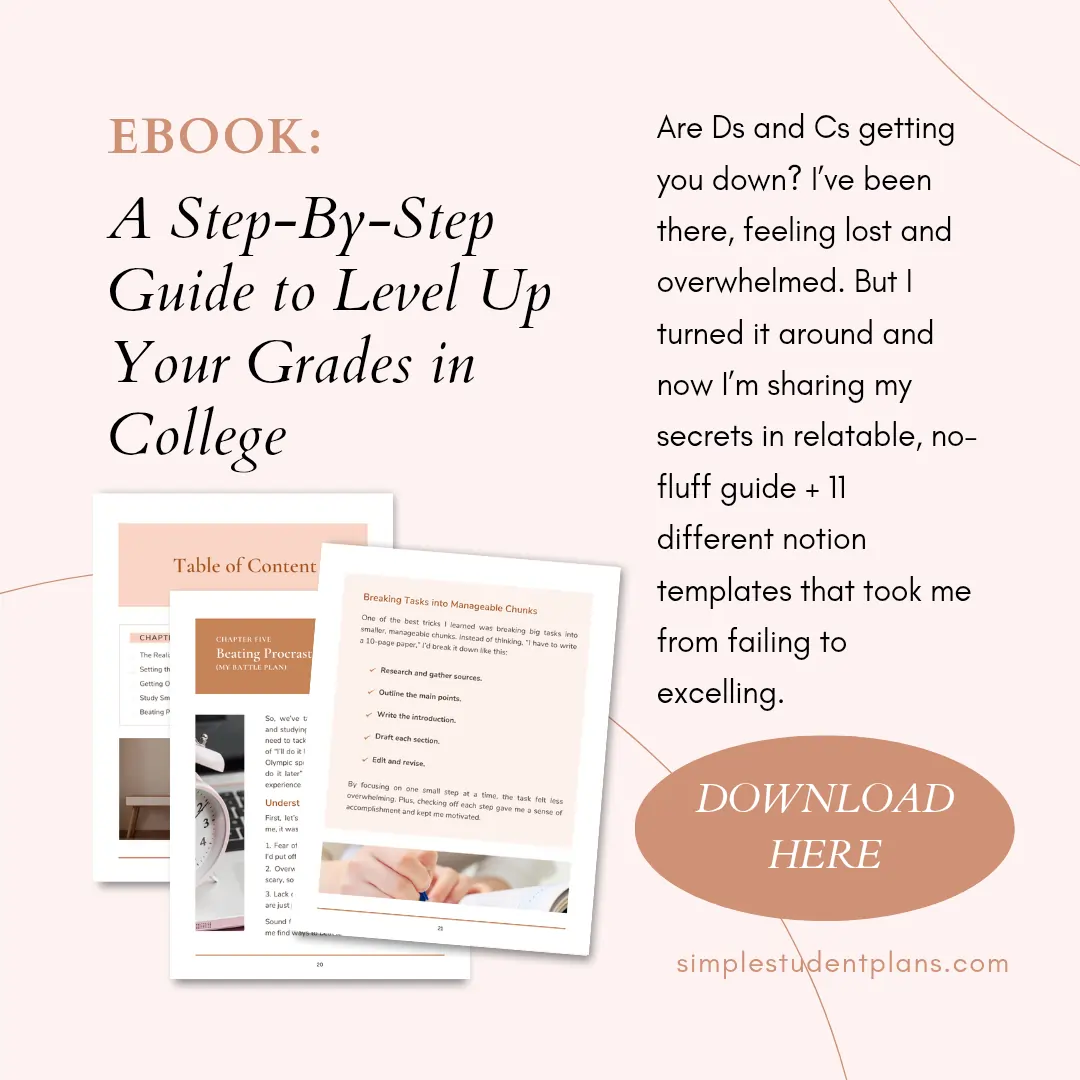College life is busy. Between lectures, assignments, part-time jobs, and social events, it’s easy to feel like there’s never enough time to study effectively. But the truth is, being successful in college isn’t about studying the longest, it’s about studying the smartest. That’s where having a productive study routine makes all the difference.
As an affiliate partner of various brands and sponsored content, SimpleStudentPlans may earn commission on qualifying purchases. Disclaimer | Advertise With Us
If you’ve ever wondered how top students seem to balance it all while still getting good grades, the secret lies in routines that boost focus, energy, and consistency. The good news? You don’t need to overhaul your entire life to create a study plan that works. With the right habits and a little discipline, you can transform the way you learn this semester.
In this post, we’ll cover 7 productive study routines that every college student should try. We’ll also explore how to build habits that stick, tools to make studying easier, and ways to keep your motivation high.
Why a Productive Study Routine Matters
A productive study routine isn’t just about cramming in more hours. It’s about:
- Maximizing focus so you retain more information in less time.
- Reducing procrastination by creating a predictable schedule.
- Improving long-term memory through consistent practice.
- Building balance between academics and personal life.
Think of it this way: athletes don’t just show up on game day and hope for the best, they follow training routines. Similarly, productive students create study routines that prepare them for exams, projects, and daily learning.
1. The Pomodoro Study Routine
If you struggle with procrastination or staying focused, the Pomodoro Technique is a game-changer.
How It Works:
- Set a timer for 25 minutes and study without distractions.
- Take a 5-minute break (stretch, grab water, or check your phone briefly).
- After four cycles, take a longer break (15–30 minutes).
This simple system prevents burnout and makes overwhelming tasks feel manageable.
Why It Works:
- Our brains can only focus intensely for short bursts.
- The built-in breaks help you recharge.
- It creates a sense of urgency that pushes you to start tasks.
Tools That Help:
- Forest App (grow a virtual tree while you focus).
- A basic kitchen timer or your phone’s timer app.
Tip: Pair this with noise-canceling headphones and lo-fi study playlists on YouTube or Spotify.
2. Morning Power Hour
Starting your day with a study power hour sets the tone for productivity.
What It Looks Like:
- Wake up, have a light breakfast, and spend one focused hour on studying before classes or distractions take over.
- Use this time for reviewing notes, reading, or working on assignments.
Why It Works:
- Your mind is fresh in the morning.
- It reduces stress since you start the day already feeling accomplished.
- Builds momentum for the rest of the day.
Pro Tip:
If mornings feel impossible, try adjusting your sleep schedule gradually. Even just 30 minutes earlier can make a big difference.
3. Active Recall and Spaced Repetition Routine
Instead of rereading your notes (which feels productive but isn’t), use active recall and spaced repetition; two scientifically proven methods to improve memory.
Active Recall:
- Close your notes and try to recall the information from memory.
- Test yourself with flashcards, practice questions, or by explaining the topic out loud.
Spaced Repetition:
- Review information at increasing intervals (e.g., 1 day, 3 days, 1 week, 1 month).
- This strengthens long-term memory.
Tools to Use:
Why It Works:
Research shows that the act of retrieving information is more effective than just rereading. Spaced repetition keeps knowledge fresh right before you’re likely to forget it.
4. Themed Study Days
If you constantly switch between subjects, you may be wasting brainpower on context switching. Instead, dedicate specific days or blocks of time to one subject.
Example:
- Monday: Math + Statistics
- Tuesday: History + Literature
- Wednesday: Science Labs
- Thursday: Writing + Projects
- Friday: Review
Why It Works:
- Helps you dive deep into a subject without mental clutter.
- Builds consistency in reviewing each subject weekly.
- Reduces the feeling of being pulled in multiple directions.
Bonus:
This is especially effective if you’re juggling multiple classes with heavy workloads.
5. The Study-Workout Combo
Exercise and studying may seem unrelated, but combining the two boosts productivity.

How to Do It:
- Study for 45–60 minutes.
- Take a 15-minute workout break (walk, stretch, or quick yoga).
- Get back to studying refreshed.
Why It Works:
- Physical activity increases blood flow to the brain.
- Breaks up long study sessions.
- Reduces stress and helps with focus.
Tools That Help:
- YouTube quick workouts (e.g., 10-minute yoga or HIIT).
- Fitness apps like Nike Training Club.
6. Group Study Routine
Sometimes studying alone can feel isolating. A structured group study routine can help.
How It Works:
- Gather 2–4 classmates.
- Set clear goals (e.g., review Chapter 3, quiz each other, solve past papers).
- Keep the group accountable with timers and breaks.
Benefits:
- Explaining concepts helps deepen understanding.
- You get different perspectives and problem-solving methods.
- Keeps you motivated (and less likely to procrastinate).
Pro Tip:
Avoid turning study groups into social hangouts. Stick to the plan first, then reward yourselves after.
7. Nightly Review Routine
End your day with a 15–30 minute review session.
What It Looks Like:
- Go over lecture notes.
- Summarize key points in your own words.
- Create a to-do list for tomorrow.
Why It Works:
- Strengthens memory before sleep (your brain consolidates learning overnight).
- Reduces last-minute cramming.
- Helps you stay organized and prepared.
Extra Tips for Building a Productive Study Routine
Here are some additional habits to supercharge your routines:
Use a Study Planner
A planner or digital tool helps you stay on track.
- Try the Panda Planner.
- Or apps like Notion and Google Calendar.
Optimize Your Study Space
- Choose a quiet, clutter-free spot.
- Keep essentials (pens, notebooks, water) nearby.
- Use good lighting to reduce eye strain.
Eliminate Distractions
- Turn off notifications.
- Use website blockers like Freedom.
- Keep your phone out of reach if possible.
Reward Yourself
- Small rewards (snack, short walk, episode of your favorite show) keep motivation high.
Example Study Routine Schedule
Here’s a sample weekly study routine using the strategies above:
| Day | Routine Example |
|---|---|
| Monday | Morning Power Hour + Pomodoro sessions (Math & Stats) |
| Tuesday | Group study + Active Recall with flashcards |
| Wednesday | Study-Workout Combo (Science & Labs) |
| Thursday | Pomodoro + Writing Projects (Themed study) |
| Friday | Morning Review + Long Spaced Repetition Session |
| Saturday | Catch-up + 1 major assignment block |
| Sunday | Light review + planning for next week |
Key Takeaways
- A productive study routine is about working smarter, not longer.
- Pomodoro boosts focus, while active recall + spaced repetition strengthen memory.
- Routines like morning power hours and nightly reviews create consistency.
- Group study and exercise breaks add variety and motivation.
- The best routine is one you can stick to; consistency matters more than perfection.
FAQs
1. How many hours should a college student study daily?
It depends on your course load, but most students benefit from 2–4 focused hours daily. The key is quality, not just quantity.
2. Is it better to study in the morning or at night?
It depends on your energy levels. Some students are morning learners, others are night owls. The most important thing is to study when you can focus best.
3. How do I stop procrastinating when studying?
Use small steps: set a timer, break tasks into chunks, and remove distractions. The Pomodoro Technique is especially effective for overcoming procrastination.
4. What is the most effective study method?
Research consistently shows that active recall and spaced repetition are the most effective for long-term learning. Pair them with a solid routine for the best results.
Final Thoughts
Every student learns differently, but what all successful students share is consistency. Building a productive study routine this semester can help you save time, reduce stress, and achieve better results without burning out.
Start small. Pick just one or two of these routines to try this week. Once they become habits, add more. Soon enough, you’ll find yourself studying smarter, staying organized, and actually enjoying the process.
